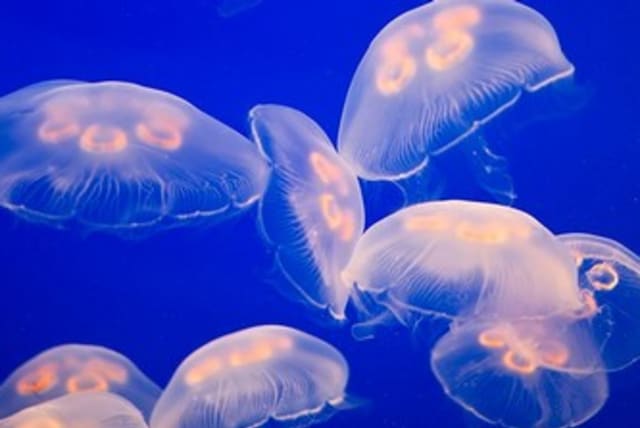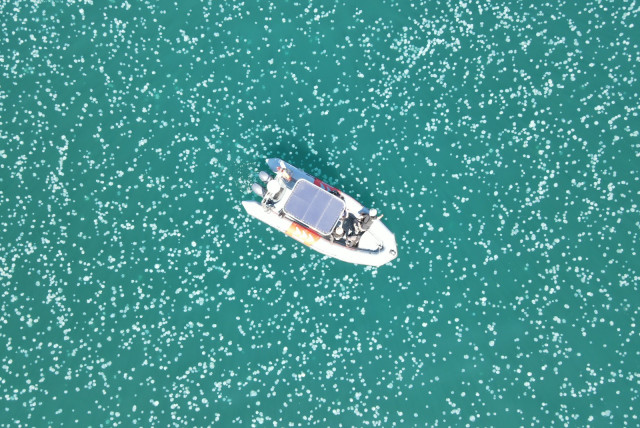Israeli jellyfish experts predict a summer jellyfish-free on Israel's shores

Usually, at this time of the year, huge swarms of jellyfish would have already reached Israel’s beaches, but now, they're almost completely free of them.
University of Haifa researchers predict “with caution” that it is very this summer will be almost free of jellyfish arriving on Israel’s shores. But they’re not willing to bet a lot of money on it, as the reality can still change, but “if you look at the past cases, this is definitely the reasonable estimate as of this moment,” the researchers said.
In contrast to previous years, when at this time of the year huge swarms of the wandering, water-logged invertebrates already reached Israel’s beaches, these are now almost completely free of them – so it’s possible that this situation will be maintained throughout the summer.
“Based on previous years when the jellyfish arrived late and we had small swarms of them, it is possible that we will see this phenomenon this year as well,” said Dr. Dor Edelist, a marine ecologist and lecturer at the university’s maritime civilizations department. In recent years, at the beginning of July, a large swarm of jellyfish has filled the beaches–clogging power plants’ filters and making bathers’ nervous because they feared being stung.
Dr. Edelist and his department colleague Prof. Dror Angel, who founded the website “Jellyfish Among the People” (Meduzot Ba’am) at www.meduzot.co.il to report the encounters with the creatures, said that today, most of the participants are pleased by the lack of jellyfish. “In previous years, we would receive reports from yachtsmen and trawlers who are in the middle of the sea that jellyfish are on their way to us.”
Dr. Gur Mizrahi, a lab manager at the university’s Charny School of Marine Sciences, reported a similar picture – this time from a bird’s-eye view. He regularly identifies jellyfish swarms flying in a light plane and then sailing a boat towards them to study them in depth. He flew at the beginning of the week but saw no jellyfish. “The area we surveyed from the air was very wide. We flew 10 kilometers from the shoreline and along all the beaches, and no swarms of jellyfish were observed. We saw a few jellyfish that may have remained in the area from the winter and spring periods,” he continued. He too predicted with a high probability that this summer will be relatively free of jellyfish.
What explains their absence?
One possibility is a change in ocean currents, which may have swept the jellyfish to other areas, they suggested, but they didn’t see swarms in other places where they could have reached due to a change in the currents. In addition, the northern current that can sweep the jellyfish to Israel’s beaches and also to more distant areas was weak this year.
The researchers agree that climate change caused the seawater to warm more slowly this year, so the temperature for the jellyfish polyps ideally to “ripen” was delayed by about two weeks. In light of this, their initial assessment was that the jellyfish would also be late for a similar amount of time, but as time passed, the jellyfish refused to come. “It’s possible that when they did mature, another factor came into the picture, for example an animal that preys on the jellyfish when they are still small. Of course, other things may have happened, because the sea is a complex and complicated system,” Angel added. “There is no doubt that a summer without jellyfish is great news for bathers, but if anyone thinks that this is the end of them, they are wrong. What happened this year does not say anything about the population of jellyfish that sit on the seabed when they are still in the polyp stage. Most likely, the polyp colonies still exist and waiting for the right conditions to hatch and release mature jellyfish into the sea. This year is just a slight blow for them,” Angel concluded.
Jerusalem Post Store
`; document.getElementById("linkPremium").innerHTML = cont; var divWithLink = document.getElementById("premium-link"); if (divWithLink !== null && divWithLink !== 'undefined') { divWithLink.style.border = "solid 1px #cb0f3e"; divWithLink.style.textAlign = "center"; divWithLink.style.marginBottom = "15px"; divWithLink.style.marginTop = "15px"; divWithLink.style.width = "100%"; divWithLink.style.backgroundColor = "#122952"; divWithLink.style.color = "#ffffff"; divWithLink.style.lineHeight = "1.5"; } } (function (v, i) { });

